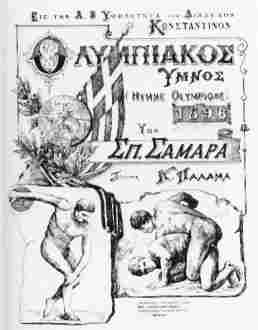- 1st Olympic Congress : 16 - 24. June 1894 Paris
(Founding Congress)
- Subject: Study and Diffusion of the Principles of Amateurism and
Revival of the Olympic Games.
- In 1904, for the first time, medals were awarded to the first three
people to finish each event a
gold medal for first place, a silver medal
for second, and a bronze medal for third. At the
Athens Games 1896 the
winners in each event received silver medals, as there was not
enough
money left to mint them in gold.
- Introduction of athletes parading during the opening ceremony behind
their national flags.
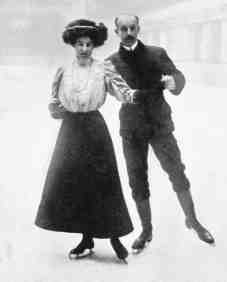
- First winter events
- The Olympic Charter was first adopted in 1908.
- First Marathon distance, 26 miles 385 yards; 42 km
195 m.
- For the first time the teams and competitors were representatives of
countries and not of clubs
or just individuals.
1912 Stockholm
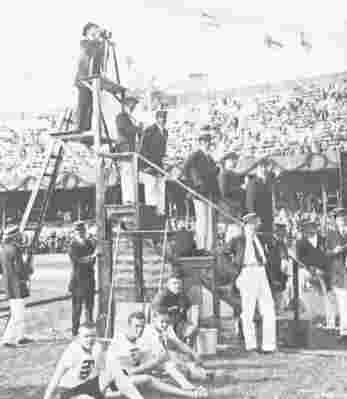
- Electronic timing introduced
- Photo finish equipment first used in close finish
track events.
- First known twins to win Olympic Gold (Carlberg
brothers, shooting)
- Introduction of athlete carrying a sign with the
name of the respective
country on it.
- First
Olympic Arts festival.
1920 Antwerp
- Olympic
flag first flown at Games 1920
in Antwerp.
- Coubertin represent the flag on the Olympic Congress 1914 in Paris.
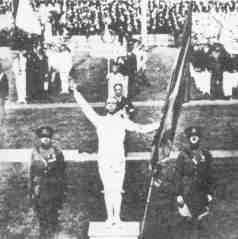
- The honour of swearing the first oath fell to the
Belgian polo player
an fencer Victor Boin.
- The Olympic oath
- Defeated in WWI, Austria, Bulgaria, Germany, Hungary and Turkey are
not allowed to
participate.
- First time of innovation at the Antwerp Games was the releasing of thousands of white doves
at the opening ceremony as a symbol of peace among nations.
1924 Paris
- In 1924 for the first time, the Games returned to
a former venue.

- The Paris Games were the fist to have an Olympic
Village for the athletes.
- Olympic motto first officially used.
The president of France, Gaston Doumergue, opened the first Games to
adopt
the slogan: "Citius, Altius, Fortius" (Swifter, Higher, Stronger)
- It was pronounced for the first time from the Dominican
father
Eric Dinon and was
adopted in the 1924 Paris Olympic Games.
- 1924 - Technology begins to win a place at the
Olympic Games with the
event's first live radio broadcast.
- First Olympic Winter Games held in St.
Moritz.
1928 Amsterdam
- First Olympic Flame to be lit and burned
throughout whole Olympic Games
- Olympic flame burned at the stadion for the first time ever.
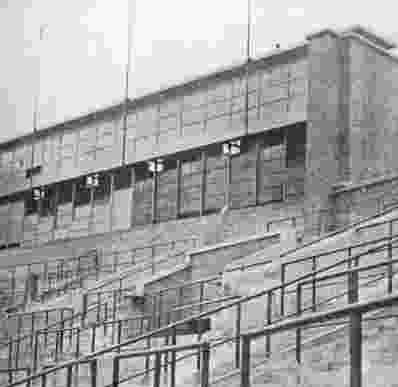
- First introduction of large results board. The
objekt of a score board
was to publish the results of the events immediately.
- Women allowed to compete in track and field
events.
- First time Greece led parade of nations.
- Slow-motion film techniques used to judge close
finishes; women's track
and field competitions held for first time.
- The photography rights were sold to a commercial
firm.
1932 Los Angeles
- Introduction of three-tiered victory stand.

Kirby Two-Eyed Electric Timing Camera
- The stop-watch and photo finish were first used at
the Olympic Games
in Los Angeles,
California. When officials found it impossible to determine the winner of the 100 meters race
by
naked eye and stop watch
alone,
newsreel film was analyzed to determine that Eddie Tolan
(U.S.) was the gold medal winner.
- First time the national anthem from the winner's
country was played and the national flag
of medallists raised.
1936 Berlin
- The Berlin Games were the first to be televised, with events broadcast
throughout the Olympic
Village, as well as German public halls and theatres. Results were transmitted internationally
by telex, and newsreel film was rushed abroad via zeppelins.
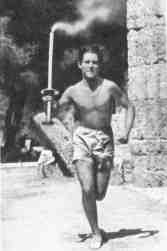
- First runner of the torch relay, Konstantin Kondylis
- First Olympic torch relay.
- 1936 Torch relay
- First Olympic Film
1948 London
- Fanny Blankers-Koen of Netherlands is first woman to win 4 gold medals
in a single Games.
1952 Helsinki
- The first Olympic coin was minted to mark the 1952 Olympic Games in
Helsinki,
Finland, 500 markka.
1956 Melbourne
- First Games to be held in the Southern Hemisphere (Melbourne)
Athletes entered during
the closing ceremony en masse for the first time to signify the friendship of the Games.
- Although live television coverage of the Olympic Games was available
internationally for the
first time, Europe and the US boycotted the sale of television rights to the Games. As a
result, only six pre-recorded, half-hour programs were accessible on a few independent
channels in the
U.S.
1960 Rome
- First live transmission and first to have world-wide TV coverage
Free of television rights
boycotts, the summer Games held later that year in Rome were the first to be fully televised.
1964 Tokyo
- Time keeping and photo finish officially used.
- First live colour pictures. Opening ceremonies broadcast via satellite to U. S. for first time.
- Results were stored on computers for the first time, marking the permanent
pervasion of
computer technology into the Olympics Games.
1968 Mexico City
- Gender testing introduced.
- First woman to light Olympic flame (Norma Enriqueta Basilio)
- First official Olympic mascot (red jaguar)
- Fosbury flop first seen.
- First doping test.
1972 Munich
- Oath for judges introduced.
- In the Games of Munich in 1972, the judges took the following oath, for the first time:
"In the name of all judges and officials, I promise that we shall officiate
in these Olympic
Games with complete impartiality, respecting and abiding by the rules,
which govern
them, in the spirit of sportsmanship".
- First woman oath, Heidi Schüller, Germany.
1976 Montreal
- Anabolic steroid testing introduced.
1980 Moscow
1984 Los Angeles
- Professionals allowed to compete in the Games.
1988 Seoul
- Christa Luding-Rothenburger became the first, and only, athlete to
win winter and summer
Olympic Games medals in the same year. She competed in speed skating and cycling.
1992 Barcelona
1996 Atlanta
- 1996 - In conjunction with the Games in Atlanta, Georgia, the first-ever
Olympic Games
website received 189 million hits.
2000 Sydney
- First time North and South Korea entered the main Olympic stadium as
one nation at
the opening ceremony.
- Steven Redgrave became the first rower to win gold medals at five
consecutive Olympic Games.
- Information technology was key to the running of the Games, and web
hits during the Games in
Sydney escalated to 11.3 billion.


